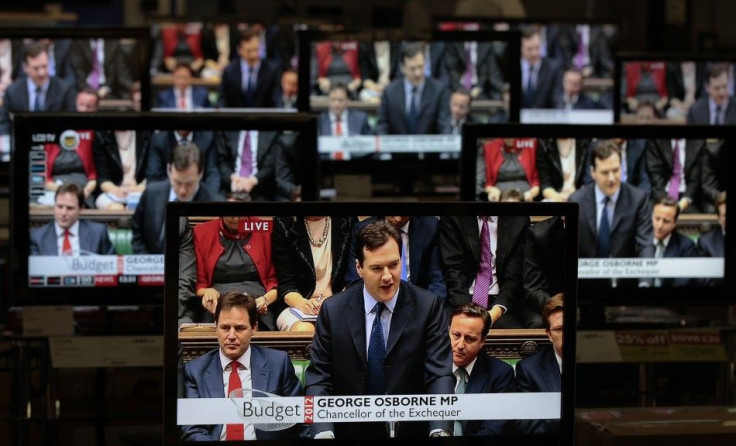UK Budget 2012: George Osborne Detail Keeps Ed Miliband at Bay - for Now [OPINION]

The normally august chamber of the House of Commons was alive with pop culture references as chancellor George Osborne squared off against Opposition leader Ed Miliband over the small matter of the nation's finances. And while both men undoubtedly landed stiff jabs in the ritualistic sparring over tax and spend, it's hard not to think that Miliband's efforts to land the knock-out punch were somewhat in vain.
It's easy to drift into point-scoring calculations, largely because financial market reaction has been largely muted: sterling and gilt prices barely budged during the 90-odd minutes of statement and reply and the stock markets have much bigger fish to fry as investors nervously watch the political tensions in Iran and Syria - and global crude oil prices - escalate.
Still, it was an entertaining session nonetheless, with the chancellor opening his third Budget statement on the front foot: This Budget will reward work, and making several parochial references to the need to earn our way in the world.
That said, he saved much of the good stuff to the end of his 57-minute speech, announcing a 5p reduction in the top rate of income tax (to 45p from 50p) that will kick in next April and a similarly timed increase in the so-called tax-free threshold to £9,205 from £7,475.
In between was a smattering of detail for the wonkish (including the adjustment of tax rates for mirco-businesses), history buffs (the UK will explore selling 100-year gilts as debt service costs, in comparative terms, hit multi-century lows), long-suffering smokers (cough up another 37p per pack, please) and video gamers (tax breaks for design and production).
Wallace & Gromit versus Downton Abbey
And it was this piece of news that elicited easily the biggest laugh of the day - at no cost to Her Majesty's Treasury and in keeping with the chancellor's promise of a fiscally neutral Budget - as Osborne promised to keep Wallace and Gromit exactly where they are, referring both to his tax credit plans for the industry and the Labour leader's (mild) resemblance to the famous cheese-eating foil to the much cleverer Gromit.
More serious stuff was effectively leaked in the days leading up to the statement with Osborne confirming a slight increase in GDP forecasts from his watchdog Office of Budget Responsibility as well as a change to the way so-called Stamp Duty (property purchase taxes) are charged and collected on homes in the UK that cost more than £2m. Those bought inside a specially created company will pay 15 percent duty; those bought privately will pay 7 percent.
There was some genuine surprise, however, on the issue of corporation, where the chancellor pledged to create the most competitive rates in world. The top rate of corporation tax will slide to 24 percent next month on its way to 22 percent by 2014 - both figures a full point lower than experts had forecast.
Overall, Osborne's approached seemed both pragmatic and sensible, if a bit pedantic, with tinkering in certain areas of business (like transport and takeaway hot food) and certain regions (like London and the southeast). It certainly wasn't a give-away budget of any description but it did allow him - given the recent, if modest improvements in the overall economy - some justification for his bolder moves on income tax and benefits.
Same Old, Same Old?
And it was here that Miliband found his target. As tradition dictates, the Opposition leader led the rebuttal of the chancellor's statement, but the minutiae of government finances isn't really his strongest suit. He seemed to stumble in his early reply, questioning whether or not the chancellor was or was not specific on certain previous pledges. The hesitation cost him momentum and the energy of the House seemed to palpably dissipate as he struggled to find his feet.
In fairness, Miliband was far more comfortable on the firmer ground of rhetorical flourish and he did manage to regain some of his swagger as he repeatedly noted the chancellor's favour for tax reduction at the higher end of the income scale. Same old Tories he thundered over and over again as he demanded a show of hands from the Cabinet of any members who would benefit from next year's 5p reduction.
Not to be outdone by Osborne's Wallace jibe, he even managed a decent sting of his own, referring to the front bench as the Downton Abbey Cabinet. They were convinced they were born to rule, he said, but in reality weren't very good at it.
Sadly, though, this was the best he had to offer. The chancellor's detail hemmed him into an unfamiliar corner and he seemed unable to box his way out.
That's not to suggest that Osborne was the winner on all points, however, as his own reckoning won't really be known for several months, if not longer, in the form of an austerity-led economic recovery. And that, as we know, is much more dependent on forces outside the remit of the Rt Hon Member for Tatton.
Chancellor George Osborne: This Budget will reward work.
© Copyright IBTimes 2024. All rights reserved.




















